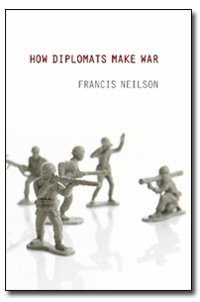George Bush, with the clock ticking down the last months of his presidency, nearly started yet another war that might have escalated in the manner of World War I: a diplomatic failure backed by arms that resulted in a superpower clash.
It is a wonder that the world has survived his “war on terror,” which turned out to be a war on American liberty and anyone in the world who got on his nerves. His confrontation with Russia in defense of a belligerent little client state of the US could have sealed his fate and ours too.
We need to examine Bush’s actions and see how the US nearly stumbled into a calamity. For in the last weeks, we have gained a picture of the future with this continued push for a secure American world empire with its endless webs of payments, relationships, jockeying for power and treasure, and a diplomatic corps honeycombed with belligerents and lobbyists for foreign governments. The peace, such as it is, can be shattered through small screwups that will end in massive death.
Make no mistake about it: the flare-up was caused entirely by US diplomatic failures. You wouldn’t know this, however, if all you did was watch television news. Fox and CNN have portrayed Georgian president Mikheil Saakashvili as a benevolent leader of a “young democracy” struggling in the shadow of the mighty bear Russia.
In fact, Saakashvili was elected on a “National Movement” ticket with a centralizing, revanchist platform of retaking the autonomous provinces in the Caucasus, and he has ruled this country the size of South Carolina with an iron fist under a state of emergency for years. He had every intention of ruling these non-Georgian peoples who do not want to be ruled by him, as even the CIA admits. As for his domestic program, it has consisted mostly of cracking down on tax evasion and beefing up state coffers.
After smashing the province Ajaria in 2004 following his rigged election, and then crushing Kodori Gorge in Abhkazia (which even has a separate language) in 2006, he moved on to South Ossetia (which also has its own language) this year, where Ossetians and Russians live and Russian peacekeepers patrol.
A young democracy? Ossetians never voted for Saakashvili. But he insisted on ruling them anyway, moving militarily and bombing the capital in the middle of peace talks on the opening day of the Olympics.
Tin-pot, fascist mini-dictators like this are a dollar a dozen, and such territorial disputes will always be with us. The critical question is: what gave Saakashvili the confidence that he could pull this off? He believed that the United States would back him as a quid pro quo for his having sent troops to Iraq. The US responded to his cooperation in Iraq — sending Georgian citizens to kill and be killed — by sending him military training support and guns and bombs, and wining and dining him in Washington.
In all the confusion of the last days, there is no question, then, that Georgia was the aggressor in South Ossetia. Russia responded within its sphere of influence both against Georgia but mostly against an incredible show of arrogance by the Bush administration. According to the New York Times, which interviewed many officials who refused to be named, the Bush administration began backpedalling very quickly, claiming that they never gave permission to Georgia to crush any separatist movement.
But by that time, the politics began. In a very scary editorial and series of speeches, John McCain all but threatened nuclear war against Russia, failing to mention that his own foreign policy adviser was a paid lobbyist for Georgia. Had McCain had his way, the US very well might have a hot war going on right now on the Russian border, fighting for the privilege of a dictator to crush the rights of South Ossetians to their own self-determination.
 No doubt that had the conflict continued — and it still might — we would have been told that we were fighting for the rights of the poor Georgian people against Russian imperialism. The American media, even before looking at the facts, had already decided who wore the halo and who wore the horns in this struggle, giving loving interviews to liars of all stripes, so long as they took the US line.
No doubt that had the conflict continued — and it still might — we would have been told that we were fighting for the rights of the poor Georgian people against Russian imperialism. The American media, even before looking at the facts, had already decided who wore the halo and who wore the horns in this struggle, giving loving interviews to liars of all stripes, so long as they took the US line.
None of which is to say that Russia wears the halo and Georgia the horns. In war, blood ends up on the hands of everyone involved, and there is no shortage of evidence to prove the case against any and all governments involved.
What we need to fix on here are the first principles. It’s an upside-down world, not all that different from the one that existed at the start of World War One, another conflict which was said to be about fighting against aggression and fighting for democracy and self-determination. As Francis Neilson said in his 1915 classic How Diplomats Make War: “No country thinks of putting these principles into practice, but somehow they seem to be worth fighting for.”
If we are to follow Neilson further, we will see that in his lessons of the start of that war, he takes aim at a central pillar of diplomacy then and now, namely the claim that the proliferation of arms guarantees the peace. He quotes Richard Cobden: “the greatest evil connected with these rival armaments is that they destroy the strongest motives for peace.”
So it has been in these diplomatic games played by our rulers. They believe they are controlling the world, when suddenly they are controlled by events. Then they rope the rest of us into it, following the usual plan of war: forcing the rest of us to adopt the government’s view of who is wearing the halos and horns, regardless of the facts:
 During a war it is no easy task to prevent your sympathy clouding your reason. The whole social system seems to be organized against any individual attempt to concentrate the attention dominantly upon the causes of the war. Governments, churches, theatres, the press, and local authorities, direct their efforts, in the main, warwards; the whole thought of society and commerce seems to be occupied with war; and all desire to question the reasons given by statesmen for participating in the war must be suppressed. It has been ruled already by certain ‘leaders of thought’ that it is unwise, unpatriotic, and un-English, to suspect the motives of Governments, or waver for a moment in swearing wholehearted allegiance to the authorities: you must think only of the war. If you dare ask for the truth, you are helping the enemy; if you suggest an early peace, you are hindering the militarists who desire no peace until their enemy is utterly crushed. Insidious, bewildering, and plausible, are the reasons given by statesmen and journalists for inflicting a humiliating defeat; without it, they tell us we must not hope for disarmament. No patriot is supposed to ask if disarmament is at all probable. No one must ask if a single statesman really believes such a blessing will follow if the enemy be annihilated.
During a war it is no easy task to prevent your sympathy clouding your reason. The whole social system seems to be organized against any individual attempt to concentrate the attention dominantly upon the causes of the war. Governments, churches, theatres, the press, and local authorities, direct their efforts, in the main, warwards; the whole thought of society and commerce seems to be occupied with war; and all desire to question the reasons given by statesmen for participating in the war must be suppressed. It has been ruled already by certain ‘leaders of thought’ that it is unwise, unpatriotic, and un-English, to suspect the motives of Governments, or waver for a moment in swearing wholehearted allegiance to the authorities: you must think only of the war. If you dare ask for the truth, you are helping the enemy; if you suggest an early peace, you are hindering the militarists who desire no peace until their enemy is utterly crushed. Insidious, bewildering, and plausible, are the reasons given by statesmen and journalists for inflicting a humiliating defeat; without it, they tell us we must not hope for disarmament. No patriot is supposed to ask if disarmament is at all probable. No one must ask if a single statesman really believes such a blessing will follow if the enemy be annihilated.
Over just a few short days, we saw this whole process beginning to play itself out, in an ominous sign for the future. But it is a future that can change. As Neilson wrote, “Citizens who desire peace can indulge in no greater folly than that which is summed up in the phrase, ‘the best way to preserve peace is to prepare for war.’ … Governments have made the war; only the peoples can make an unarmed peace.”




